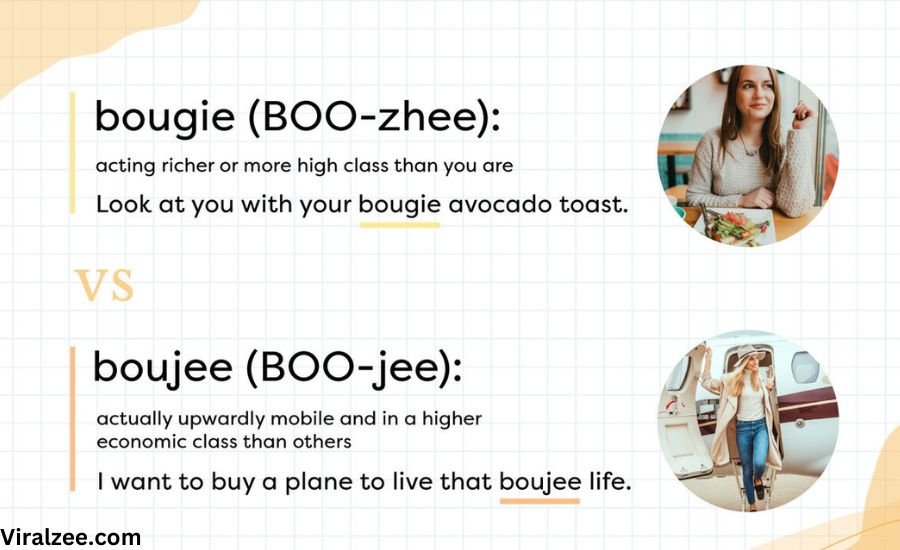In today’s social media-driven world, many slang terms rise and fall in popularity. Among these terms, boujee and bougie are often used interchangeably, but do they really mean the same thing? If you’ve ever wondered, “What is boujee vs bougie?” and whether you’re using them correctly, you’ve come to the right place. In this article, we’ll explore the origins, differences, and cultural implications of these two popular slang terms.
What is Boujee vs Bougie? A Breakdown of the Slang
Both boujee and bougie are derived from similar ideas, but they are not the same. The key difference lies in their origins and how they are used in different contexts.
- Bougie (pronounced BOO-zhee) is a term rooted in the French word bourgeoisie, which historically referred to the middle class. In modern slang, it is often used to describe someone who is trying to appear wealthy, sophisticated, or high-class but doesn’t necessarily belong to that group. It can have a negative or sarcastic tone, suggesting that someone is pretending to be more elite than they really are.
- Boujee (pronounced BOO-jee), on the other hand, has a more positive connotation and is associated with genuine success. This term was popularized by the hip-hop community, particularly through the song “Bad and Boujee” by Migos. It refers to individuals who are enjoying a luxurious, high-end lifestyle that they’ve earned, often through their own hard work.
The Origins of Boujee and Bougie: Tracing Their Roots

Understanding where these terms come from helps clarify why their meanings differ:
- Bougie: The term bougie comes from the French word bourgeoisie, which refers to the middle class, especially those who are wealthier than the working class but not part of the aristocracy. In Marxist theory, the bourgeoisie owned the means of production and were seen as capitalists. Over time, this term evolved to describe people who display materialism and a desire to be seen as part of the elite class, even if they don’t truly fit the mold.
- Boujee: Boujee became widely popular in the 2010s, largely due to the influence of hip-hop culture. The term was made famous by Migos in their hit song “Bad and Boujee.” In this context, boujee celebrates success—especially the kind of success achieved through hard work, talent, and sometimes a little flair. People who are boujee are often portrayed as enjoying luxury but doing so in an authentic and earned way.
When to Use Bougie and Boujee: A Cultural and Contextual Guide
Both words are often used in casual conversations, but knowing when to use each one is important to get the nuance right:
- Bougie: Typically used to describe someone who is pretending to be wealthy or living a life of luxury. It’s often used in a humorous or critical tone to highlight pretentious behavior. For example, if someone buys an expensive item they can’t afford just to show off, they might be called bougie.
- Boujee: This term is more celebratory and positive. It refers to people who have genuinely achieved success and are now able to enjoy the finer things in life. For example, someone who worked hard to start their own business and is now living comfortably might be described as boujee.
Bougie: The Old Money Lifestyle Explained
The term bougie is often used to describe individuals who are part of the old-money elite. These people may have inherited wealth or belong to a social class that has traditionally been seen as wealthy or high-status.
In today’s world, bougie behavior often involves showcasing wealth through luxury cars, designer clothing, expensive tastes, and exclusive events. However, the term can also carry a negative connotation, implying that the person is overly concerned with appearances or pretends to belong to a higher class than they actually do.
For example:
- “She’s so bougie, always flexing her Louis Vuitton bag.”
- “He acts bougie, like he’s from the old money crowd, but his family isn’t that rich.”
Boujee: New Money and Hip-Hop Influence
In contrast to bougie, boujee represents the new-money lifestyle. This term is heavily influenced by hip-hop culture, which often celebrates the journey from humble beginnings to newfound success. People who are described as boujee have worked hard to build their wealth and are not afraid to enjoy the fruits of their labor.
The rise of boujee is closely tied to the hip-hop community, where rappers and entrepreneurs proudly showcase their wealth, not just as a sign of status but as a symbol of perseverance and hustle. In this context, the term is much more about authenticity, individuality, and the thrill of achieving success against the odds.
For example:
- “He’s living that boujee life with his new sports car.”
- “She’s boujee, rocking the latest fashion from head to toe.”
Examples of Boujee vs Bougie in Everyday Language
While bougie and boujee can be used in similar contexts, the difference in tone and implication is key:
- Bougie: “She’s acting bougie with her designer coffee mug.” This implies that the person is being pretentious, showing off without truly fitting in.
- Boujee: “They’re living boujee with their new penthouse and vacationing in the Maldives.” This implies that the person has earned their wealth and is enjoying a high standard of living.
How Boujee vs Bougie Reflects Socioeconomic Status
The way we use bougie and boujee can reveal a lot about how we perceive social class.
- Bougie often reflects a desire to appear wealthy or sophisticated, even if it’s just for show. It can indicate insecurity or an attempt to fit in with a more elite group.
- Boujee, however, reflects a sense of pride in one’s achievements and a willingness to flaunt the success earned through hard work. People who are boujee are comfortable in their success and don’t feel the need to hide it.
Also Read: high-risk-merchant-account-at-highriskpay-com
How to Use Bougie and Boujee in the Right Context
To use these terms correctly, it’s essential to understand the context.
- Bougie is generally used to describe behavior that feels fake or pretentious. It’s a playful criticism often aimed at people who try too hard to show off their wealth or sophistication.
- Boujee, on the other hand, is used when someone genuinely enjoys the benefits of their hard-earned success. It has a positive, celebratory tone and is often used to express admiration or pride.
Boujee vs Bougie in Popular Culture: Influencers, Celebrities, and Music

Celebrities and influencers play a major role in shaping how these terms are used.
- Boujee has been popularized by artists like Migos, who use it to describe their rise to success and how they now enjoy a luxurious lifestyle. It’s a term that has come to represent the hustle and the reward that follows.
- Celebrities also embrace these terms, with some using boujee to describe their lifestyle and others getting labeled as bougie for showing off too much on social media.
The Evolution of Slang: Boujee and Bougie in the Modern World
Language is always evolving, and so are boujee and bougie. Both terms have taken on new meanings, especially in the context of social media. What used to be an insult or criticism has transformed into a badge of honor, especially for those who want to show they’ve made it.
Conclusion
Ultimately, both bougie and boujee are tied to the concept of wealth, class, and status, but they represent different attitudes towards these concepts. Bougie is often used critically to describe people who pretend to be high-class, while boujee is about celebrating hard-earned success and living luxuriously without apology.
Stay informed with the latest news and updates on viralzee.com


